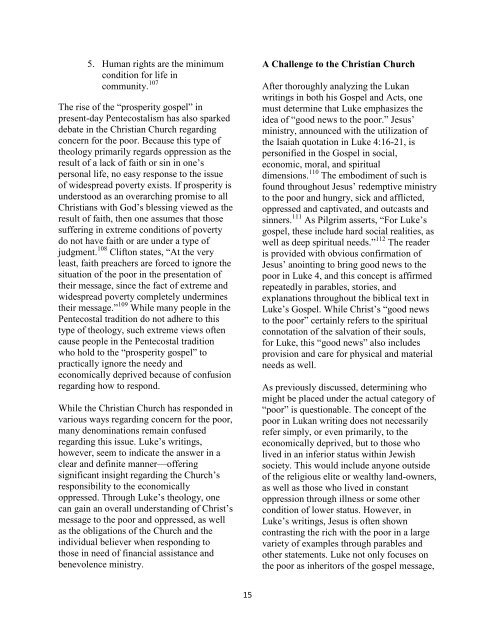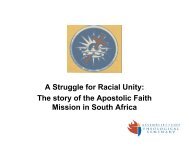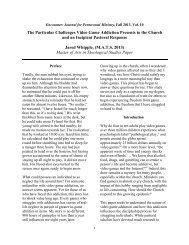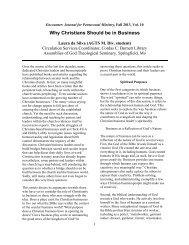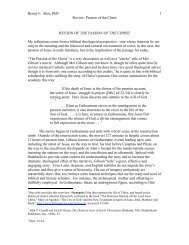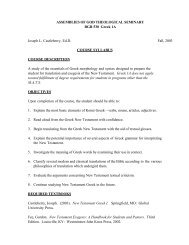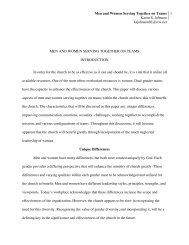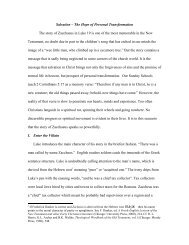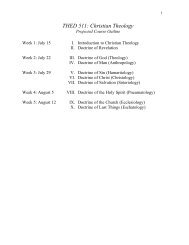Encounter: Journal for Pentecostal Ministry - Assemblies of God ...
Encounter: Journal for Pentecostal Ministry - Assemblies of God ...
Encounter: Journal for Pentecostal Ministry - Assemblies of God ...
Create successful ePaper yourself
Turn your PDF publications into a flip-book with our unique Google optimized e-Paper software.
5. Human rights are the minimum<br />
condition <strong>for</strong> life in<br />
community. 107<br />
The rise <strong>of</strong> the “prosperity gospel” in<br />
present-day <strong>Pentecostal</strong>ism has also sparked<br />
debate in the Christian Church regarding<br />
concern <strong>for</strong> the poor. Because this type <strong>of</strong><br />
theology primarily regards oppression as the<br />
result <strong>of</strong> a lack <strong>of</strong> faith or sin in one‟s<br />
personal life, no easy response to the issue<br />
<strong>of</strong> widespread poverty exists. If prosperity is<br />
understood as an overarching promise to all<br />
Christians with <strong>God</strong>‟s blessing viewed as the<br />
result <strong>of</strong> faith, then one assumes that those<br />
suffering in extreme conditions <strong>of</strong> poverty<br />
do not have faith or are under a type <strong>of</strong><br />
judgment. 108 Clifton states, “At the very<br />
least, faith preachers are <strong>for</strong>ced to ignore the<br />
situation <strong>of</strong> the poor in the presentation <strong>of</strong><br />
their message, since the fact <strong>of</strong> extreme and<br />
widespread poverty completely undermines<br />
their message.” 109 While many people in the<br />
<strong>Pentecostal</strong> tradition do not adhere to this<br />
type <strong>of</strong> theology, such extreme views <strong>of</strong>ten<br />
cause people in the <strong>Pentecostal</strong> tradition<br />
who hold to the “prosperity gospel” to<br />
practically ignore the needy and<br />
economically deprived because <strong>of</strong> confusion<br />
regarding how to respond.<br />
While the Christian Church has responded in<br />
various ways regarding concern <strong>for</strong> the poor,<br />
many denominations remain confused<br />
regarding this issue. Luke‟s writings,<br />
however, seem to indicate the answer in a<br />
clear and definite manner—<strong>of</strong>fering<br />
significant insight regarding the Church‟s<br />
responsibility to the economically<br />
oppressed. Through Luke‟s theology, one<br />
can gain an overall understanding <strong>of</strong> Christ‟s<br />
message to the poor and oppressed, as well<br />
as the obligations <strong>of</strong> the Church and the<br />
individual believer when responding to<br />
those in need <strong>of</strong> financial assistance and<br />
benevolence ministry.<br />
15<br />
A Challenge to the Christian Church<br />
After thoroughly analyzing the Lukan<br />
writings in both his Gospel and Acts, one<br />
must determine that Luke emphasizes the<br />
idea <strong>of</strong> “good news to the poor.” Jesus‟<br />
ministry, announced with the utilization <strong>of</strong><br />
the Isaiah quotation in Luke 4:16-21, is<br />
personified in the Gospel in social,<br />
economic, moral, and spiritual<br />
dimensions. 110 The embodiment <strong>of</strong> such is<br />
found throughout Jesus‟ redemptive ministry<br />
to the poor and hungry, sick and afflicted,<br />
oppressed and captivated, and outcasts and<br />
sinners. 111 As Pilgrim asserts, “For Luke‟s<br />
gospel, these include hard social realities, as<br />
well as deep spiritual needs.” 112 The reader<br />
is provided with obvious confirmation <strong>of</strong><br />
Jesus‟ anointing to bring good news to the<br />
poor in Luke 4, and this concept is affirmed<br />
repeatedly in parables, stories, and<br />
explanations throughout the biblical text in<br />
Luke‟s Gospel. While Christ‟s “good news<br />
to the poor” certainly refers to the spiritual<br />
connotation <strong>of</strong> the salvation <strong>of</strong> their souls,<br />
<strong>for</strong> Luke, this “good news” also includes<br />
provision and care <strong>for</strong> physical and material<br />
needs as well.<br />
As previously discussed, determining who<br />
might be placed under the actual category <strong>of</strong><br />
“poor” is questionable. The concept <strong>of</strong> the<br />
poor in Lukan writing does not necessarily<br />
refer simply, or even primarily, to the<br />
economically deprived, but to those who<br />
lived in an inferior status within Jewish<br />
society. This would include anyone outside<br />
<strong>of</strong> the religious elite or wealthy land-owners,<br />
as well as those who lived in constant<br />
oppression through illness or some other<br />
condition <strong>of</strong> lower status. However, in<br />
Luke‟s writings, Jesus is <strong>of</strong>ten shown<br />
contrasting the rich with the poor in a large<br />
variety <strong>of</strong> examples through parables and<br />
other statements. Luke not only focuses on<br />
the poor as inheritors <strong>of</strong> the gospel message,


